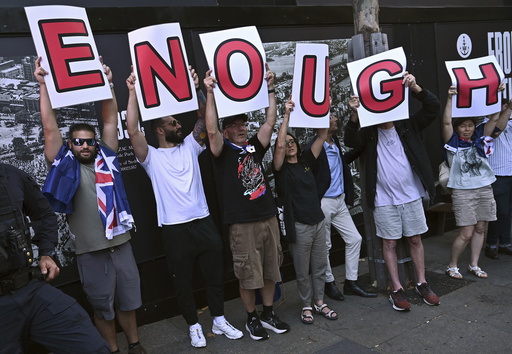
WELLINGTON, New Zealand — Australia is currently grappling with a surge of antisemitic violence, which has seen numerous incidents of vandalism and arson targeting Jewish homes, schools, and synagogues. Since October, police have arrested twelve individuals linked to these crimes, with hundreds more facing charges related to antisemitic offenses over the past year. This wave of anti-Jewish sentiment has ignited widespread condemnation and incited a complex discussion about its origins and responsible parties. Notably, Australia’s federal government has moved towards a rare consensus by advancing new hate crime legislation with significant support from across party lines.
Prime Minister Anthony Albanese emphasized the urgency of these developments, stating the need for accountability for those involved in antisemitic activities, underscoring, “We want people who are engaged in antisemitic activities to be caught, to be charged and to be put in the clink.” Opposition leader Peter Dutton echoed this sentiment, declaring it a national crisis.
What is the situation in Australia’s cities? Significant increases in hate-fueled incidents have been reported, targeting both Jewish and Muslim communities since the Hamas attack on Israel on October 7, 2023, which led to the ongoing war in Gaza. Different organizations have noted that while definitions of antisemitism and Islamophobia may vary, all indicate a marked rise in incidents.
Particularly severe incidents have occurred in Sydney and Melbourne, where the majority of Australia’s Jewish population resides. Since November, these incidents have included the discovery of a trailer filled with mining explosives and a list of Jewish targets near Sydney and a firebombing of a synagogue in Melbourne, resulting in injuries. Additional acts have included the arson of a Jewish childcare facility, graffiti on Jewish schools with supremacist imagery, and multiple Jewish businesses being attacked.
Authorities have confirmed that twelve individuals have been arrested in relation to these crimes, alongside nearly 200 additional charges filed in New South Wales since the beginning of October 2023. Investigators are probing the possibility that these attacks may involve foreign influence, with some officials suggesting the involvement of contract criminals rather than individuals motivated by antisemitism. This raises questions about the orchestration of these crimes by external entities, a connection explored with no definitive evidence confirmed to-date.
Lawmakers have linked these spikes in incidents with the new climate of antisemitism resulting from the ongoing conflict, suggesting the events of October 7 have catalyzed an unprecedented surge. During public debates reflecting a global dialogue, some conservative lawmakers have accused pro-Palestinian protests of fueling antisemitism, particularly among progressive groups and university students. However, other leaders within the Jewish community advise caution, highlighting concerns that explicitly linking these incidents to the Palestine movement could inadvertently foster further division and prejudice.
In response, the Albanese government has released a series of measures aimed at bolstering laws against hate crimes covering various characteristics, including race and religion. The recent proposals, which have garnered substantial support in the House of Representatives, suggest the imposition of mandatory sentences for those convicted of terrorism-related offenses and for displaying hateful symbols. The bill proceeded with a vote tally of 117 in favor to 13 against, and is expected to be adopted by the Senate.
Additional actions have included sanctions against online extremist financing networks, the criminalization of Nazi salutes, new regulations against doxing, and the appointment of national envoys dedicated to combating both Islamophobia and antisemitism. As states like New South Wales initiate their own legislative actions against hate crimes, the broader context in which these events unfold raises unique considerations.
Globally, cases of antisemitism have surged since October 2023, provoking strong reactions and prompting significant Jewish emigration from Europe. However, experts note that Australia’s circumstances are somewhat distinct; the potential for foreign orchestrators, alongside a community largely accustomed to peace, may create a different landscape. With Australian society preparing for a national election by May, the emotional resonance of these attacks has thrust them into the political spotlight, introducing further debate among lawmakers.
The political discourse surrounding these stark increases in antisemitic acts has also prompted significant scrutiny of how long-standing issues of racism and discrimination against other groups, including Muslims and Indigenous communities, are addressed. Amidst the rising tide of fear within the Australian Jewish community, individuals have reported an unprecedented sense of vulnerability, with a growing unease that may lead to more significant incidents in the future.

